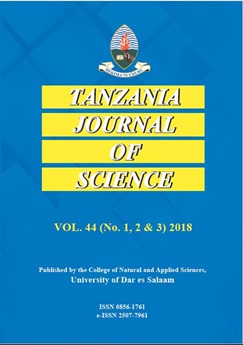Knowledge, Attitudes and Practices towards the Use of Iron and Folic Acid Supplements among Pregnant and Lactating Women in Dar es Salaam
DOI:
https://doi.org/10.4314/tjs.v48i3.11Abstract
The current study investigated knowledge, attitudes and practices (KAP) regarding the use of iron and folic acid (IFA) supplements among pregnant and lactating women living with Human Immunodeficiency Virus (HIV) in Dar es Salaam. A cross-sectional survey involved 294 pregnant and lactating women attending Prevention of Mother-To Child Transmission (PMTCT) clinics. A semi-structured questionnaire was used to collect data from the subjects. The data were analysed using SPSS. Multivariate regression analysis was carried out to determine factors associated with IFA supplement use among the study subjects. The findings indicated that knowledge of IFA supplement use among the subjects was good (92.2%). Most of the respondents (89.8%) had appropriate perceptions of IFA supplements. The subjects also showed positive attitudes towards the use of IFA supplements during pregnancy and lactation. However, practices towards the use of supplements were not satisfactory. It was further revealed that only 15.2% of the women received supplements during pregnancy and a few weeks after delivery as recommended. Women claimed the main barriers towards using the supplements were bad taste (46.7%) and nausea (45.2%). The multivariate logistic regression model showed that factors like being a businesswoman, comfortable use of the supplements and experiencing any barriers were significantly associated with practices on the use of the supplements. Thus, healthcare workers should clear up the misconceptions about using the supplements and instruct women on how to manage their potential side effects as they have been doing with other conditions or illnesses.
Keywords: Iron, folic acid, anaemia, supplements, knowledge, attitude, practice, pregnant, lactating women.


